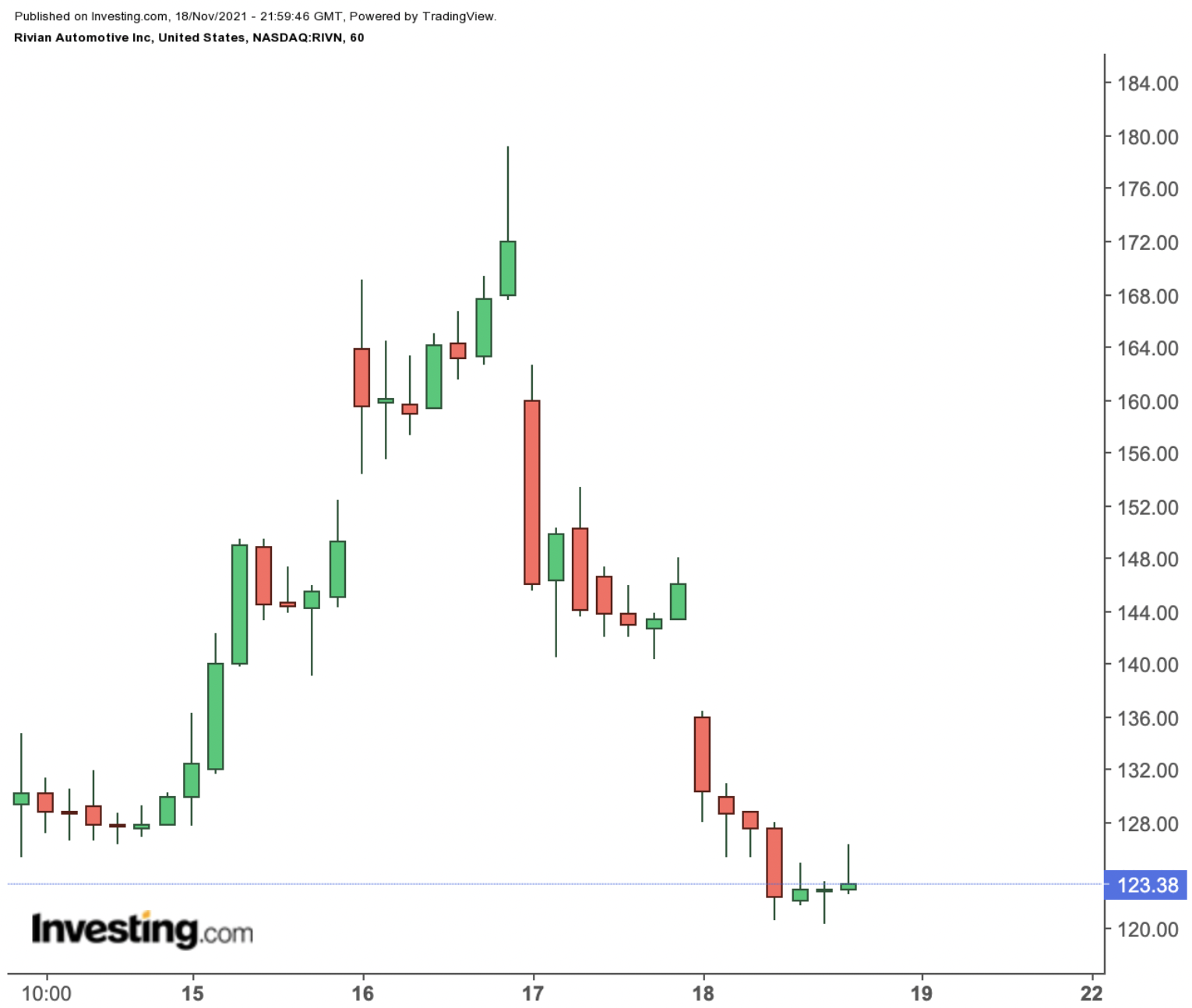Investors in Rivian Automotive (NASDAQ:RIVN) are facing an abrupt halt to an eye-popping rally that started after the electric car-maker’s blockbuster initial public offering last week.
Its shares have plunged more than 20% during the past two days after the five-day spike that pushed its stock 121% higher from the IPO price of $78. At one point, the post-IPO buying spree made Rivian worth more than almost 90% of S&P 500 companies, including stocks like Boeing (NYSE:BA), Starbucks Corp. (NASDAQ:SBUX) and Caterpillar (NYSE:CAT).

This kind of volatility in EV stocks is not a new trend. The market leader, Tesla (NASDAQ:TSLA), has gone through multiple boom-and-bust periods during the past five years. Tesla shares have been under extreme pressure since Elon Musk did a Twitter poll earlier this month asking voters if he should sell 10% of his stake in the company, and followed it up with a string of stock sales.
The biggest uncertainty that is embedded in EV companies is their sky-high valuations, which are hard to justify by any rationale. Rivian—with the backing of some blue-chip investors, including Ford (NYSE:F), Amazon (NASDAQ:AMZN) and asset manager T. Rowe Price Group—has to prove quickly that it’s living up to investors’ expectations.
Rivian plans to use $12 billion raised through the IPO to expand its factory production and speed development of future vehicle models. In July, Reuters reported that Rivian was planning to invest $5 billion in a second assembly plant. The company said its current Illinois factory can produce up to 150,000 vehicles a year.
Amazon’s 20% Stake
Amazon, which in 2019 took a 20% stake in the company, became the biggest buyer of Rivian vehicles when founder and Chief Executive Officer Jeff Bezos ordered 100,000 Rivian electric delivery vans for its logistics business.
Rivian is developing an electric pickup truck—R1T—and an SUV—R1S. It started delivering some trucks in September, mostly to its own employees. It estimates that annual production will hit 150,000 vehicles at its main facility by late 2023.
“We built a platform that is incredibly scalable,” said Rivian CEO R.J. Scaringe this month in an interview with Bloomberg Television. The “platform has allowed us to go really fast in building out the commercial side of our business, with our first customer really being a flagship with Amazon and their initial order” of vans.
Demand for electric vehicles is likely to remain strong, helped by government subsidies to promote clean technologies. US President Joseph Biden plans to spend billions of dollars in building out a network of EV charging stations as part of his latest infrastructure spending.
In addition, the Irvine-based Rivian says the market for electric vehicles will be at least $1 trillion by 2025 and exponentially larger within a decade.
There is a strong possibility that Rivian could become a successful player in the EV market due to its significant lead in the battery-powered pickup truck market. But investors should also note that it’s going to be a long road ahead for the company to bridge the gap between expectations and fundamentals.
Scaling production is historically the riskiest part of a company’s lifecycle, and Rivian has many years to hit that stage. For comparison, Tesla took a decade to scale up and deliver its first full year of profit.
Bottom Line
Investors will get a much better entry point to buy Rivian stock and take part in this potential EV growth story. Right now, there is greater risk of losing money after the initial IPO hype. Waiting on the sidelines is a better strategy for long-term investors in our view.
